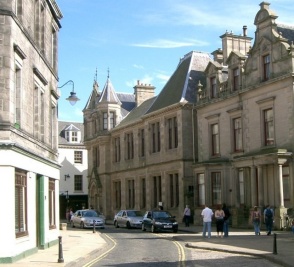In Dunfermline, we’re pretty proud of one of our most famous exports, industrialist and philanthropist Andrew Carnegie.

His legacy is everywhere. In street names, school names, business names and our concert hall that is slightly less famous than the similar named Carnegie Hall in New York. An Andrew Carnegie statue proudly watches over the dog walkers, joggers and kids on scooters using Pittencrieff Park, and a short stroll away from this wonderful green space, you’ll find the Andrew Carnegie Birthplace Museum.
Andrew Carnegie gave more to the town of Dunfermline than just a famous association to draw visitors for years to come. The son of a weaver, Carnegie emigrated to America with his parents in the mid 19th century, and it was there, in the land of opportunity, he built up a steel empire that made him one of the wealthiest industrialists of his time.
Carnegie never forgot his humble Dunfermline roots spending the last few years of his life as a philanthropist, giving back to society. He was heavily committed to using his wealth to support social reform and educational advancement and it was Dunfermline where he chose to build the first of his public libraries.

Carnegie Library, Dunfermline
The original Carnegie Library is currently closed, and its collections can be accessed in other buildings, as the building undergoes an ambitious refurbishment that will eventually house a museum, gallery and library space. I think Carnegie would approve of this project.
Carnegie’s library initiative led to the creation of 2,509 libraries being built around the world between 1883 and 1929. One of these libraries has made the news recently. Located at Loughborough Junction, London, the Grade II listed Carnegie Library has fallen foul of budget cuts; Lambeth council has announced its closure.
However a group of community campaigners and authors are fighting back to save the library, occupying the building, organising petitions and online campaigns in a bid to reverse the decision.
Carnegie would surely be tossing and twisting in his grave. The library that he worked so hard to bequeath is to be turned into a gym if the occupiers lose their battle.
Carnegie believed in giving back to the “industrious and ambitious” and those “who are anxious to help themselves” and his library grants were issued to towns under the condition that:
• there was sufficient public support for the library
• the council would provide the library site
• staff would be paid to maintain the library
• public funds were used to run the library
• the libraries would be a free service to all
We live in very different times now, and a society in which the rags-to-riches achievements of a man like Carnegie can occur is arguably far more difficult if not impossible, as opportunities for determined and ambitious young people who are not propped up by family wealth are beginning to shrink.
What would the man who said “a man who dies rich, dies disgraced” think about our current society in which the gulf between rich and poor widens, and headlines are dominated by tax havens rather than acts of philanthropy?
The internet has opened up access to information in a way that even the best of libraries could never achieve but not everyone has access to superfast broadband and the latest i-phone. Equal access to information helps to level out the rocky playing field of life, and libraries play that hidden role of offering crucial IT access to job hunters and trained staff who can support those less well equipped to navigate a Google search.
Libraries may not be cost-efficient to run and may never generate a decent financial return but what about their overall contribution to society? You can’t put a price on creating a cornerstone for a community and that’s what a library can do. Libraries can be a warm, safe place to seek out some hope for the jobless; a connection to the rest of the world for the elderly; a haven for new parents to nurture their babies’ early development; a cornucopia of new worlds for schoolchildren to explore. Some services need protecting.
The Carnegie Occupation is now about more than just a single library closing. It’s a reaction against a shift in our societal values. It’s sticking up for arts, culture and community, and defending those who don’t always have a voice. It’s a kickback against excessive greed, a collective roar against austerity. It’s a fight that I think Carnegie would wish to put his name to.
Further reading
I really enjoyed reading your post and agree with your points. I read a great book about the ‘Intellectual History of the Working Class’ which cites Carnegie and the development of the public library as an essential step in politicising the working classes. It’s so important that we save them. Bronte
LikeLiked by 1 person
Thanks for reading and commenting. That sounds like an interesting book. I’ll check it out and maybe post a review on it at some point.
LikeLiked by 1 person
Brill! Would be great to compare notes!
LikeLike